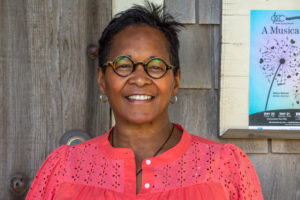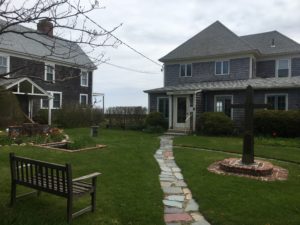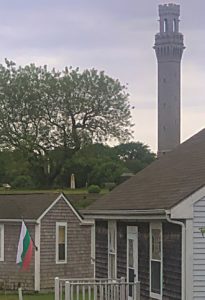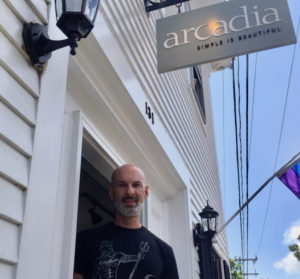PROVINCETOWN — Amid a massive workforce housing crisis that threatens the survival of local businesses, one idea appears to be Heaven sent.
The members of the vestry of St. Mary of the Harbor, the Episcopal church at 517 Commercial St., are working out final details with restaurant owners Joachim Sandbichler and Mark Ferrari to house six to eight of their summer J-1 student visa workers in the church’s vacant rectory.
“We feel very excited about it,” Sandbichler said on May 8. “But it is only a tiny part of the solution.”
The rectory, an elegant 1880 three-bedroom, two-bathroom home on the waterfront next to the church, is normally reserved for the resident priest, said Mary-Jo Avellar, a member of the church deanery. But when Pastor Terry Pannell retired recently, the vestry found the Rev. Bill Rich, formerly of Trinity Church in Copley Square, Boston, to take Pannell’s position. Rich already had a home in Truro and did not need the waterfront digs, Avellar said.

Meanwhile, Arlene Weston, whom Sandbichler and Ferrari hired to scout summer housing for their employees, had been picking through the meager offerings for seasonal workers in a town where the median sales price so far this year is nearly $2 million for a single-family home and $849,000 for a condominium, according to the Cape Cod & Islands Association of Realtors. That is 31 and 41 percent, respectively, over the median sales prices one year ago.
More than 53 percent of the properties Cape-wide that closed in March went for above the asking price, the association reports.
Sandbichler and Ferarri own two restaurants, the Patio American Grill & Cocktail Bar and Pepe’s Wharf, and are about to open a third, Freemans, at 333 Commercial St. in the former Café Edwige. They need housing for about 100 employees and have secured enough for 40 of them through “gumshoe work,” Sandbichler said.
This year, the restaurant owners knew the housing problem would be worse than ever. That is why they employed Weston, not just as the general manager of Freemans but also as a real estate scout beginning in February. She has been hunting for “B-minus” real estate that could be used for seasonal housing ever since, Sandbichler said.
“I read ads fast and get to people right away,” Weston said. “I think housing is possible if you start early enough and have the money to secure it.”
How bad is it this year? Weston’s housing search this winter included two potential scams. In one case, she nearly fell for a rental offer until she went in person and saw the unit fully occupied. Another time, online scammers offered her a three-bedroom in Truro for $10,000. “Just send me the money and you can see it tomorrow,” she was told. “Do you think I screwed my head on this morning,” she replied.
Sandbichler said rooms usually renting for $4,000 for the season are now $12,000. He has toured places so vile he wishes he could forget them. Like many business owners, he and Ferarri already own apartments for staff. They rent out parts of their restaurant buildings for employees to live in and subsidize the rent other workers must pay.

“We started getting into the housing business years ago when we saw how the J-1 students had to live,” he said. “Shame on us that our workers have to live in these conditions.”
He and Ferrari redo floors, paint, rip up old carpeting, and generally try to make the places habitable. But what is on the market this year takes more than elbow grease. It is also incredibly overpriced.
In the middle of this struggle, a SeasCape Realty agent Weston was working with told her the St. Mary’s vestry might be available.
“I said, ‘Are you serious? The house is beautiful,’ ” Weston said.
St. Mary’s new pastor did not return calls from the Independent. Mike Sutila, treasurer of the church vestry, said of the agreement, “We thought, what a perfect fit. We are really excited about it.”
The J-1 visa students are expected to move in this Sunday, May 15, Sutila said.
“It worked out very well for us,” Weston said. “To get a house with a massive living room right on the water. You cannot beat it.”
No one would discuss the exact terms. The church is charging rent that “is not a steal and not overly expensive,” Sandbichler said. “We are very grateful to them.”
Still, he added, the cost of real estate remains a huge problem and does not bode well for the sustainability of local businesses and the town generally. “If all the businesses become condominiums,” he said, “there will be nothing else and then why would people come here?”




